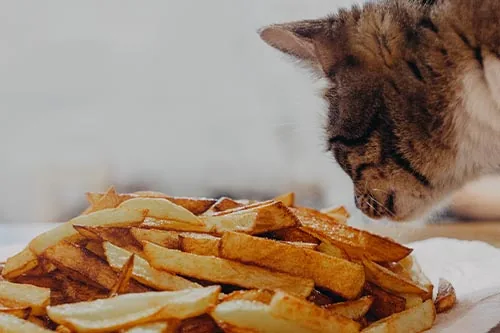Can Cats Eat Potatoes?
Potatoes are a common food in many households, and it’s natural to wonder if your cat can enjoy a bite. In this blog, we’ll explore whether cats can eat potatoes, potential risks, and when it’s best to contact a vet for guidance. If you’re ever unsure about what foods are safe for your cat, give us a call at Lagniappe Animal Hospital at (318) 255-3303. Our team is happy to help.

Are Potatoes Safe for Cats?
Cats are obligate carnivores, which means their bodies are designed to get the nutrients they need from meat. While potatoes aren’t toxic to cats, they don’t provide the essential nutrients your cat requires to thrive. Potatoes are high in carbohydrates, but cats don’t need carbs in their diet the way humans or dogs do. Feeding your cat potatoes regularly could lead to weight gain or digestive issues.
If your cat happens to eat a small amount of plain, cooked potato, it’s generally safe. However, certain forms of potatoes—like those that are raw, fried, or seasoned—can pose risks. For this reason, it’s important to know what type of potatoes your cat is getting into and how they are prepared.
Why Raw Potatoes Are Dangerous
Raw potatoes contain a substance called solanine, which is toxic to cats. Solanine is found in raw potato flesh, skin, and leaves. Even a small amount of solanine can cause symptoms like vomiting, diarrhea, lethargy, and confusion in cats. In some cases, solanine poisoning can lead to more serious complications that require immediate veterinary care.
Cooking potatoes destroys solanine, but raw potatoes should never be given to your cat. If your cat accidentally eats a raw potato or a piece of potato skin, contact your veterinarian right away. At Lagniappe Animal Hospital, we can assess your cat’s condition and provide the care they need.
Cooked Potatoes and Cats
Cooked potatoes are generally safe for cats to eat in small quantities, but they don’t offer any real health benefits. Cats require a protein-rich diet, and potatoes won’t provide the essential nutrients like taurine that your cat needs for a healthy heart, vision, and immune system. While potatoes are a source of carbohydrates, your cat’s digestive system isn’t built to process large amounts of carbs.
If you choose to give your cat a small taste of cooked potato, make sure it’s plain—no butter, salt, or seasoning. Some seasonings, like garlic and onion, are toxic to cats and can cause serious health issues. It’s best to avoid offering potatoes at all, but if you do, be sure they are completely plain and in moderation.
Mashed Potatoes and Cats
Mashed potatoes may seem harmless, but they can also pose a risk depending on how they’re prepared. Many mashed potato recipes include ingredients like butter, milk, cream, or garlic. These ingredients can cause digestive upset in cats, leading to vomiting or diarrhea. Garlic, in particular, is highly toxic to cats and can result in anemia if consumed.
Even if your mashed potatoes are made without harmful ingredients, they still offer little to no nutritional value for your cat. Feeding your cat too many starchy foods like mashed potatoes could contribute to obesity over time. If you’re concerned about your cat’s diet or have questions about what foods are safe, contact us at Lagniappe Animal Hospital.
French Fries and Other Fried Potatoes
Fried potatoes, such as French fries, hash browns, and potato chips, are not suitable for cats. Fried foods are typically high in fat, which can lead to pancreatitis in cats. Pancreatitis is a condition where the pancreas becomes inflamed, causing pain and digestive problems. Symptoms include vomiting, loss of appetite, and abdominal pain.
The added salt and seasonings often found on fried potatoes are also harmful to cats. Salt can lead to sodium ion poisoning, and seasonings like garlic or onion can be toxic. Cats have very specific dietary needs, and fried or processed foods like French fries don’t align with their nutritional requirements. It’s best to avoid giving your cat any kind of fried potato.
Signs Your Cat May Have Eaten Unsafe Potatoes
If your cat eats raw potatoes or a type of potato that’s unsafe, they may start to show symptoms of distress. Common signs of potato poisoning or an upset stomach in cats include:
- Vomiting
- Diarrhea
- Lethargy
- Confusion or disorientation
- Loss of appetite
- Tremors or seizures in severe cases
If you notice any of these symptoms after your cat eats potatoes, it’s important to contact your vet immediately. Even if you’re unsure whether your cat ate something harmful, it’s always better to be cautious. We’re here to help at Lagniappe Animal Hospital, and you can reach us at (318) 255-3303 for advice or to schedule an appointment.
Healthier Treats for Cats
Instead of feeding your cat potatoes, there are plenty of other healthier treats you can offer. Cats benefit most from high-protein snacks that align with their carnivorous nature. Cooked chicken, turkey, or fish can be great treats, as long as they’re prepared without seasoning or oils. There are also many commercially available cat treats that are formulated to provide the nutrition your cat needs.
It’s important to keep treats limited to 10% or less of your cat’s daily calorie intake. Feeding too many treats, even healthy ones, can lead to weight gain and other health problems. If you’re unsure about what treats are safe or want to discuss your cat’s diet, give us a call at Lagniappe Animal Hospital.
Should You Feed Your Cat Potatoes?
While small amounts of plain, cooked potatoes are not harmful to most cats, it’s best to avoid feeding them altogether. Potatoes do not provide the nutrition cats need, and some forms of potatoes—especially raw or seasoned—can be dangerous. If you want to share a snack with your cat, opt for something that better suits their dietary needs.
If your cat accidentally eats potatoes or shows signs of illness, don’t wait to get in touch with a veterinarian. At Lagniappe Animal Hospital, we can answer any questions you have and ensure your cat stays healthy. Contact us at (318) 255-3303 to learn more or to schedule an appointment.

